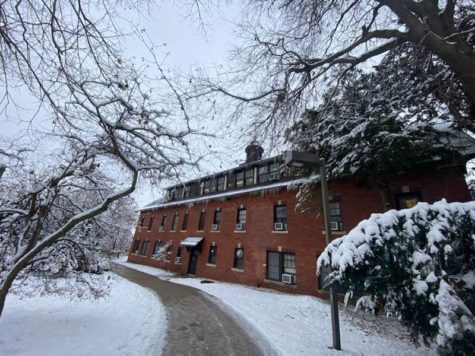Dorms: Opportunities for leadership
June 21, 2010
Students who live in the residence halls and are interested in leadership opportunities can become involved in one of the many residence hall councils.
The first level of involvement students may have is the house system.
Each house within a residence hall has a student-run cabinet, consisting of a group of officers elected by the house members.
The next level of involvement is the residence hall student government.
The student government consists of representatives from each house that serve on an executive board and hall senate.
In order to become a senate member in the residence hall, a student must first serve as president of their house cabinet.
“In most houses you need to have been a resident for at least a semester before you can run for house president,” said Erin Donnelly, senior in accounting and Friley Hall social co-chairwoman.
“I would suggest getting involved with your house early on in your first year, and running for president at the end of your second semester if you’d like to be a senator.”
Inter-Residence Hall Association Vice President Justin Nauman, senior in management information systems, said executive board members of each respective residence hall are voted on in the spring semester.
The councils are held accountable for several different responsibilities.
“In Buchanan, we work with the CAs [community advisers] to decide on semester events to plan, sponsor dinners for residents, and make capital purchases for the hall desk – movies, games, vacuums, etc.,” said Betsy Jensen, senior in animal science and Buchanan Hall president.
“Everybody on the executive council holds two office hours per week, where residents and senators can come to them with questions, concerns or ideas,” Donnelly said.
There are many benefits to becoming involved in one of the residence hall councils.
“Friley Senate decides what happens with the students fees paid to the hall and what social events will take place,” Nauman said. “It is a great feeling knowing that you will be giving back to the community.”
Having a say in what goes on within the residence halls and meeting new people are other reasons students get involved in the councils.
“Senate is a great way to get your voice heard,” Donnelly said. “Also, you get a chance to make friends with people that you otherwise would never have met because Friley’s such a huge building. I made a lot of great friends through senate.”
Another level of involvement within the residence halls is the Inter-Residence Hall Association, a group consisting of elected representatives from each residence hall council.
“IRHA allocates funding for events and organizations that benefit all residence hall students and acts as a representative of residence hall students and ISU Dining in interactions with other organizations,” said Rajin Olson, junior in electrical engineering and IRHA president.
“Students only need to pay attention to flyers and e-mail and run for positions that they would like to hold,” Olson said. “It’s easy to get involved.”
However, if a student does not want to hold a governmental position within the IRHA, he or she may attend the meetings and have their voice heard.
The only difference is that they will not be able to vote on any decisions the IRHA makes, Olson said.
As with the residence hall councils, the IRHA also offers many benefits to becoming actively involved.
“IRHA is a great place to network, make friends, gain leadership experience and, most importantly, impact the lives of all residence hall students on campus,” Olson said. “If a student wants to get involved in campus organizations early and effectively, IRHA is a great place to do it.”
















